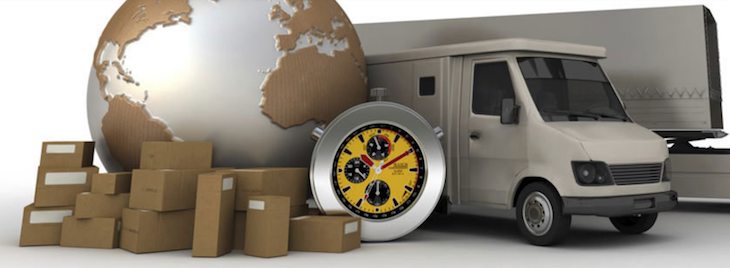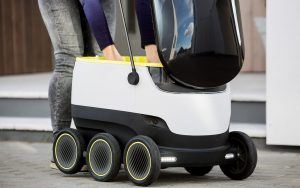Final mile delivery grows for J.B. Hunt, ArcBest; UPS to test autonomous robot at University of Arkansas
by February 14, 2017 1:21 pm 1,471 views

From his office in the Willard J. Walker Hall at the University of Arkansas, John Kent, director of the Supply Chain Management Research Center, sees an autonomous robot driving on a sidewalk in front of the McMillon Innovation Studio, a university lab testing new technologies impacting the retail sector. The six-wheel robot, with a carrying capacity of a 48-quart cooler, has been undergoing social acceptance testing on campus since last spring, but it’s about to start a new phase of testing — making final mile deliveries for UPS.
“I think we’re their only test location in the United States,” Kent said.
London-based Starship Technologies, the robot’s maker, has been working in the lab with a team of UA students, faculty and staff to test the robot and was recently “mapping out” campus sidewalks in preparation for its delivery debut. UPS is expected start testing the robot with final mile shipments in the next month.
Unlike unmanned aerial vehicles, or drones, the robots don’t have the same restrictions, which have kept drone use in a testing phase in the United States and led retailers like Amazon to the United Kingdom, where drone delivery is already available. But even so, the lab received approval from the UA, city of Fayetteville and those to whom the robot will make deliveries before they start.
Over the years, carriers have offered final mile service, representing the final leg in the shipment of an item, allowing for business or home delivery and the installation of bulky items, such as dishwashers or treadmills. While final mile delivery is a service that’s been offered by Lowell-based carrier J.B. Hunt Transport Services for the past 11 years, it’s been available for almost twice that long from Fort Smith-based transportation company ArcBest and even longer from parcel carriers like FedEx, UPS and the U.S. Postal Service. And as e-commerce business booms, the final mile service is only expected to continue to grow.
“It’s almost always more than a mile by the way,” Kent said. “Final miles maybe.”

Kent, who is also clinical assistant professor for the UA’s Supply Chain Management department in the Sam M. Walton College of Business, said final mile, like the service J.B. Hunt offers, is a more contemporary name for white glove service.
SHIPPING SOLUTIONS
J.B. Hunt’s final mile service was established in 2006 in Little Rock and “started as a Dedicated Contract Services (DCS) solution for the world’s largest appliance manufacturer,” said John Vargo, vice president of operations. As e-commerce “began to boom, shippers needed national coverage and consistent brand experience to deliver non-palletized product to the front door in a timely manner.”
The carrier has 92 distribution centers from which it “provides retail, jobsite and home delivery of heavy and bulky product like furniture, bedding, fitness equipment, appliances and cabinetry across the whole country.” The company uses its DCS infrastructure “to provide a growing number of services to other shippers that do not fit in the truckload or less-than-truckload space because of volume, handling and in-home service needs.” In fiscal 2016, the company’s DCS division, its second largest by revenue, accounted for 29% or $205.24 million of its operating income.
Vargo said the carrier increases the number of nearby stops each truck makes by “commingling” merchandise, meaning that one truck might contain items from several shippers.
“We’re now looking to expand by working with medium to large retailers and other direct shippers of this type of product who have enough volume on their own to fill local delivery routes with their own merchandise. There is a tremendous amount of volume and opportunity there, and we are just getting started in that space,” he said.
Customers of the final mile service like the one J.B. Hunt offers might include large retailers that sell appliances or furniture stores, Kent said. The customers might seek carriers to provide this service or they could have their own private fleets. Customers might send out requests for proposals for the service, but carriers would be expected to provide not only the cost for the service but also specifics about the drivers who are providing it.
“This is a high touch service,” Kent said. “They are touching the customer.”
The drivers who make the in-home deliveries and install the products are in uniform and wear gloves and surgical shoe covers.
NICHE SERVICE
Nationwide, hundreds of companies, which include public and private fleets, are providing final mile service, Kent said. Less-than-truckload carriers like ABF Freight “fit more naturally in this space,” he said. But J.B. Hunt “has found a niche.” In New York City, customers likely won’t see the company’s trucks pulling a 53-foot-long trailer but a box truck hauling final mile goods.
In spring 2013, Nick Hobbs, president of J.B. Hunt’s Dedicated Contract Services division, spoke about the service at a retail supply chain conference at the UA.
“FedEx does a great job delivering small packages to the front door, but I didn’t see any major carrier taking large bulky items into the home and assembling or installing them for the manufacturer,” he said. “So we started doing it.”
ArcBest offers its final mile service nationwide, and started it about 20 years ago, “giving us a great deal of confidence in our ability to meet customers’ needs for final mile services,” company spokeswoman Kathy Fieweger said. “These can be fairly complex deliveries and require a great deal of expertise, ability to meet appointment windows and so on.”
Special trucks sometimes are required, including those with “trailers equipped with lift gates to allow for delivery of products to consumers, delivered to homes.” ArcBest started providing the service with its U-Pack residential moving business.
The outlook is good on final mile and “is an area of growth for many logistics companies, including ours,” Fieweger said. Final mile service is expected “to continue to grow as more and more products are purchased over the internet.”
Vargo also expects more final mile distribution centers will be added “as volume grows and consumers become more comfortable purchasing large items online.”
But for smaller internet orders, expect to start seeing some of those reaching their final destination by way of a six-wheel robot like the one traveling on sidewalks and using crosswalks on the UA campus.
